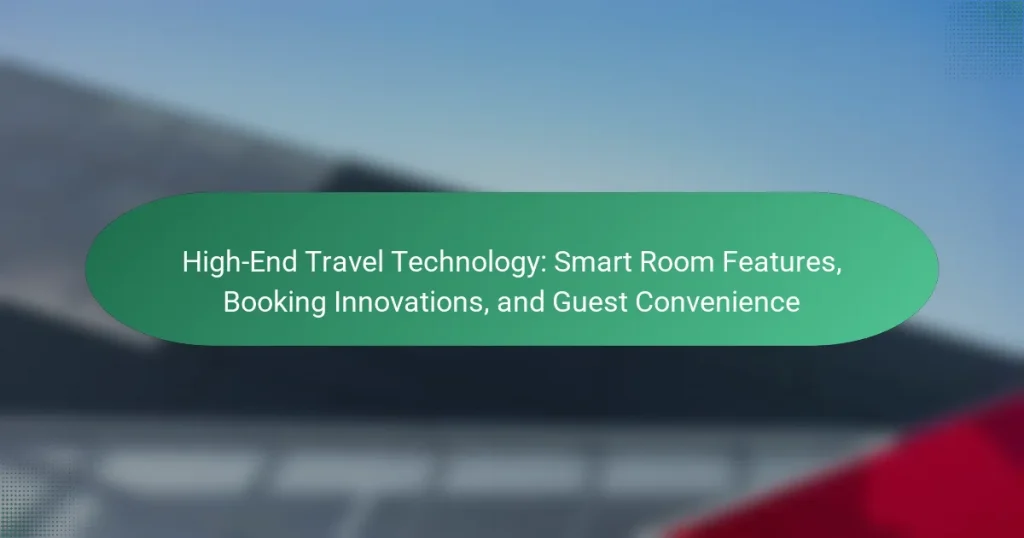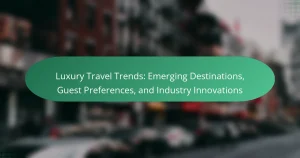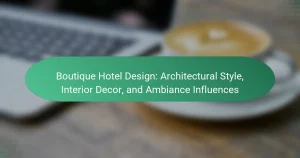High-end travel technology encompasses advanced systems and tools that enhance the travel experience through luxury, convenience, and efficiency. Key components include smart room features such as automated lighting, climate control, and integrated entertainment systems, which personalize guest experiences. Booking innovations leverage artificial intelligence and mobile applications to streamline the reservation process, offering tailored itineraries and real-time updates. The integration of these technologies in luxury hotels and resorts aims to improve guest satisfaction while focusing on future trends like enhanced personalization, sustainability, and seamless service.

What is High-End Travel Technology?
High-end travel technology refers to advanced systems and tools designed to enhance the travel experience. This technology includes smart room features, personalized booking solutions, and seamless guest services. High-end travel technology aims to provide luxury, convenience, and efficiency for travelers. For example, smart room features may include automated lighting and climate control. Booking innovations can offer tailored itineraries and instant confirmations. These advancements improve guest convenience and satisfaction. The integration of high-end travel technology is increasingly prevalent in luxury hotels and resorts.
How does high-end travel technology enhance the travel experience?
High-end travel technology enhances the travel experience by providing personalized services and seamless convenience. Smart room features allow guests to control lighting, temperature, and entertainment systems through mobile apps or voice commands. Booking innovations streamline the reservation process, enabling instant confirmations and tailored travel itineraries. Contactless check-in and check-out procedures reduce wait times and enhance safety. Advanced concierge services, powered by AI, offer personalized recommendations based on individual preferences. Enhanced in-room entertainment options, including streaming services and virtual reality experiences, elevate leisure time. Moreover, real-time travel updates keep guests informed about flight status and local events. Overall, these technologies significantly improve comfort, efficiency, and satisfaction during travel.
What are the key features of high-end travel technology?
High-end travel technology includes advanced features that enhance guest experiences. Smart room controls allow guests to manage lighting, temperature, and entertainment systems. Mobile check-in and digital room keys streamline the arrival process. Personalized recommendations are provided through AI-driven concierge services. High-speed internet connectivity is standard for seamless communication and entertainment. Integrated payment systems simplify transactions for guests. Data analytics improve service delivery based on guest preferences. Sustainability features, like energy-efficient systems, appeal to eco-conscious travelers.
How does high-end travel technology differ from standard travel technology?
High-end travel technology features advanced customization and premium services that standard travel technology lacks. High-end systems often include smart room features like automated lighting, climate control, and personalized entertainment options. These technologies enhance guest comfort and convenience significantly. Standard travel technology typically offers basic amenities without such extensive personalization. Additionally, high-end booking innovations provide seamless experiences, such as AI-driven recommendations and instant upgrades. Standard systems focus on functionality and price comparison, lacking the luxury touch. The difference is evident in user experience, where high-end travel technology prioritizes exclusivity and tailored services.
What are the main components of high-end travel technology?
The main components of high-end travel technology include smart room features, advanced booking systems, and personalized guest services. Smart room features utilize IoT devices for lighting, temperature control, and entertainment. Advanced booking systems streamline reservations through AI and machine learning. Personalized guest services enhance experiences through tailored recommendations and concierge assistance. These components improve convenience and satisfaction for travelers. High-end hotels increasingly adopt these technologies to differentiate themselves in a competitive market.
What role do smart room features play in high-end travel technology?
Smart room features play a crucial role in high-end travel technology. They enhance guest experiences through automation and personalization. Features like smart lighting, temperature control, and voice-activated assistants provide convenience. These technologies adjust to individual preferences, ensuring comfort during stays. Enhanced security systems, such as smart locks, offer increased safety for guests. Data analytics from smart rooms help hotels optimize services and predict guest needs. According to a report by Statista, 70% of luxury travelers prefer accommodations with smart technology. This demonstrates the growing demand for smart room features in the hospitality industry.
How do booking innovations contribute to the overall experience?
Booking innovations enhance the overall experience by streamlining the reservation process. They allow for quick comparisons of options, leading to informed decisions. Innovations like mobile apps enable instant bookings, increasing convenience for travelers. Personalized recommendations based on user preferences improve satisfaction. Real-time updates on availability ensure guests secure their desired accommodations. Additionally, integrated payment systems simplify transactions, reducing friction. Research shows that 70% of travelers prefer platforms that offer seamless booking experiences. This preference highlights the significance of booking innovations in modern travel.
Why is guest convenience a priority in high-end travel technology?
Guest convenience is a priority in high-end travel technology because it enhances the overall guest experience. High-end travelers expect seamless interactions and personalized services. Technologies such as mobile check-in, smart room controls, and concierge apps streamline processes. These innovations reduce wait times and improve accessibility to services. A study by the American Hotel and Lodging Educational Institute found that 80% of guests prioritize convenience in their travel experiences. Additionally, convenience leads to higher guest satisfaction and loyalty. Satisfied guests are more likely to return and recommend the service to others. Thus, prioritizing convenience in high-end travel technology is essential for success in a competitive market.
How does high-end travel technology personalize guest experiences?
High-end travel technology personalizes guest experiences through customized services and tailored interactions. Smart room features adjust lighting, temperature, and entertainment based on guest preferences. Mobile apps enable guests to control their environment and request services effortlessly. Advanced data analytics track guest behavior to anticipate needs and preferences. Personalized communication enhances guest engagement through targeted offers and recommendations. AI-driven chatbots provide instant assistance and personalized responses. Seamless booking innovations allow for tailored itineraries that reflect individual interests. These technologies collectively create a unique and memorable experience for each guest.
What impact does high-end travel technology have on customer satisfaction?
High-end travel technology significantly enhances customer satisfaction. It provides personalized experiences through smart room features. Guests can control lighting, temperature, and entertainment systems easily. Booking innovations streamline the reservation process, reducing wait times and errors. These technologies often include mobile apps for convenience. Research indicates that 70% of travelers prefer hotels with advanced tech amenities. Enhanced connectivity and automation lead to a more enjoyable stay. Overall, high-end travel technology meets modern expectations and improves guest loyalty.
How is high-end travel technology evolving?
High-end travel technology is evolving through advancements in smart room features and innovative booking systems. Smart rooms now integrate IoT devices for personalized guest experiences. These devices allow guests to control lighting, temperature, and entertainment systems via mobile apps or voice commands. Booking innovations include AI-driven platforms that provide tailored travel recommendations. These platforms analyze user preferences to enhance the booking process. Furthermore, contactless technology is becoming standard in luxury accommodations. Guests can check-in and access rooms using mobile keys. This evolution enhances convenience and safety for travelers. Data from industry reports indicate a growing demand for such technologies in luxury travel experiences.
What trends are shaping the future of high-end travel technology?
Trends shaping the future of high-end travel technology include personalization, automation, and sustainability. Personalization enhances guest experiences through tailored services and recommendations. Automation streamlines operations, improving efficiency in booking and check-in processes. Sustainability focuses on eco-friendly practices, appealing to environmentally conscious travelers. Smart room features integrate IoT devices, allowing guests to control lighting, temperature, and entertainment through mobile apps. Data analytics enables hotels to anticipate guest needs, ensuring a seamless experience. Contactless technology has gained traction due to health concerns, providing safer interactions. Virtual reality offers immersive previews of destinations, enhancing decision-making for travelers. These trends collectively redefine luxury travel, prioritizing convenience and guest satisfaction.
How are emerging technologies being integrated into high-end travel?
Emerging technologies are being integrated into high-end travel through innovations such as smart room features and advanced booking systems. Smart rooms utilize IoT devices to enhance guest comfort and convenience. These rooms can adjust lighting, temperature, and entertainment systems based on guest preferences. Advanced booking systems leverage AI to offer personalized recommendations and streamline the reservation process. Contactless check-in and mobile room keys enhance security and efficiency for travelers. Virtual reality is being used for immersive destination previews, allowing guests to explore before arrival. Data analytics helps hotels optimize service delivery and tailor experiences. These integrations aim to elevate guest satisfaction and operational efficiency in luxury travel.
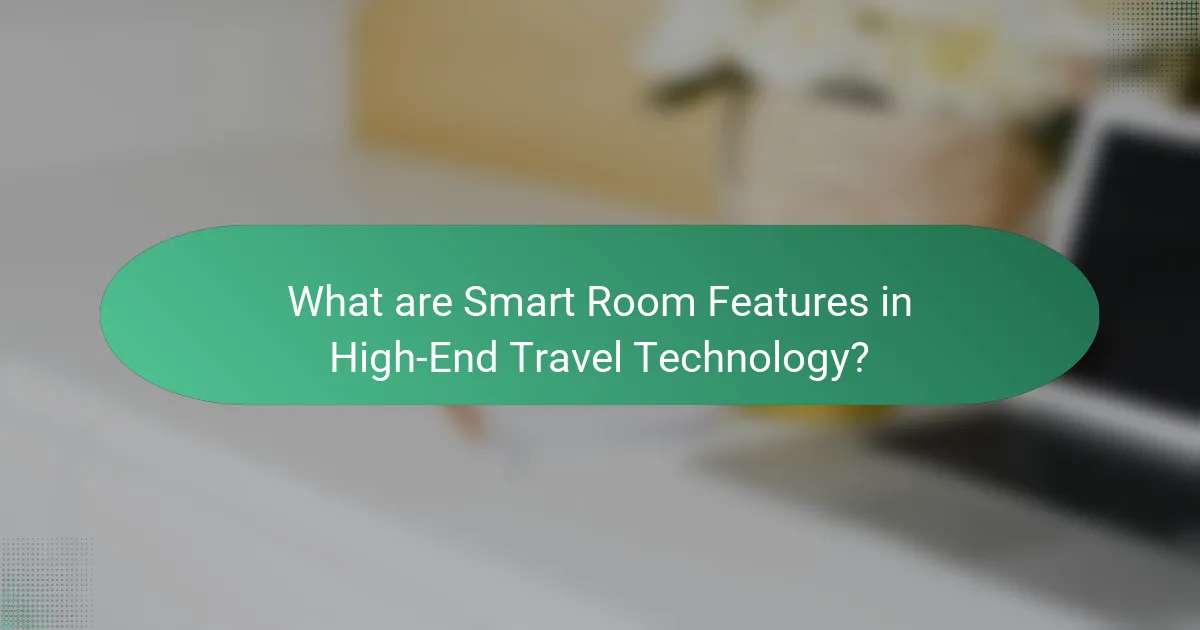
What are Smart Room Features in High-End Travel Technology?
Smart room features in high-end travel technology enhance guest experiences through automation and connectivity. These features include smart lighting systems that adjust based on guest preferences. Temperature control allows guests to set their ideal climate via mobile apps or voice commands. Integrated entertainment systems provide access to streaming services on demand. Voice-activated assistants enable guests to control room settings hands-free. Keyless entry systems enhance security and convenience for guests. Smart mirrors can display information such as news and weather. Automated curtains and blinds offer privacy and light control with a simple command. These advancements reflect a growing trend in the hospitality industry towards personalized and efficient guest services.
How do smart room features improve guest comfort?
Smart room features significantly enhance guest comfort through personalized control and automation. Guests can easily adjust lighting, temperature, and entertainment systems via smart devices. This customization allows for a tailored environment that meets individual preferences. Smart technology also enables seamless integration with personal devices, enhancing convenience. For example, voice-activated controls allow guests to make adjustments hands-free. Additionally, smart rooms often feature automated curtains and smart thermostats, which optimize energy use while maintaining comfort. According to a study by J.D. Power, 62% of hotel guests appreciate technology that enhances their stay. This indicates that smart room features are not only a luxury but also a valued aspect of guest experience.
What specific technologies are commonly found in smart rooms?
Smart rooms commonly incorporate technologies such as smart lighting, automated climate control, and advanced entertainment systems. Smart lighting allows guests to adjust brightness and color using voice commands or mobile apps. Automated climate control systems enable personalized temperature settings for comfort. Advanced entertainment systems often include smart TVs and streaming services for enhanced viewing experiences. Additionally, voice-activated assistants facilitate hands-free control of room features. Security technologies, including smart locks and surveillance cameras, ensure guest safety. These technologies improve convenience and enhance the overall guest experience in high-end accommodations.
How do smart room features enhance energy efficiency?
Smart room features enhance energy efficiency by automating and optimizing energy use. These systems adjust lighting, heating, and cooling based on occupancy and preferences. For instance, smart thermostats can learn user habits and reduce energy consumption when rooms are unoccupied. Additionally, smart lighting systems can turn off automatically when no one is present, further minimizing energy waste. According to a study by the American Council for an Energy-Efficient Economy, smart technologies can reduce energy usage by up to 30%. Integrating these features leads to significant cost savings and a lower carbon footprint for hotels and guests.
What are the security implications of smart room technology?
Smart room technology can pose significant security implications. These systems often connect to the internet, making them vulnerable to hacking. Unauthorized access can lead to data breaches, exposing personal information of guests. Additionally, smart devices may be used to surveil individuals without consent. Weak default passwords and lack of encryption further increase risks. A study by the Ponemon Institute found that 60% of organizations experienced a data breach due to unsecured IoT devices. Therefore, the integration of smart room technology demands robust security measures to protect user data and privacy.
How is guest data protected in smart room environments?
Guest data in smart room environments is protected through multiple security measures. These include encryption of data during transmission and storage. Access controls limit who can view or use guest information. Regular software updates patch vulnerabilities in smart room systems. Additionally, privacy policies ensure compliance with data protection regulations. For instance, the General Data Protection Regulation (GDPR) mandates strict guidelines for handling personal data. These measures collectively safeguard guest data against unauthorized access and breaches.
What measures are taken to ensure privacy in smart rooms?
Smart rooms implement several measures to ensure privacy for guests. These include advanced encryption for data transmission. Strong authentication methods protect user access to devices. Smart rooms also utilize localized data storage to minimize external data exposure. Regular software updates address potential security vulnerabilities. Additionally, user-controlled privacy settings allow guests to manage their data sharing preferences. Surveillance systems are often designed to respect personal space, with clear notifications of their presence. These measures collectively enhance guest trust and security in smart room environments.
How do smart room features facilitate personalization for guests?
Smart room features facilitate personalization for guests by allowing tailored control of the environment. Guests can adjust lighting, temperature, and entertainment systems according to their preferences. Smart technology often uses data from previous stays to anticipate guest needs. For example, it can remember preferred room settings and automatically apply them. Voice-activated assistants enhance convenience by enabling guests to request services or information hands-free. Integration with mobile devices allows guests to manage room features remotely. Research shows that 70% of travelers appreciate personalized experiences during their stays. These features contribute to a more comfortable and enjoyable visit, enhancing overall guest satisfaction.
What role do user interfaces play in smart room technology?
User interfaces are crucial in smart room technology as they facilitate user interaction with various smart devices. They provide intuitive control over lighting, temperature, and entertainment systems. Effective user interfaces enhance guest experience by simplifying operations. For instance, touchscreens and mobile apps allow users to customize their environment easily. Voice-activated systems further streamline interactions, making technology more accessible. Research shows that user-friendly interfaces can significantly increase guest satisfaction in high-end accommodations. A study by the Cornell University School of Hotel Administration found that 70% of guests prefer intuitive interfaces in hotel rooms. This highlights the importance of user interfaces in ensuring a seamless and enjoyable smart room experience.
How can guests customize their smart room experience?
Guests can customize their smart room experience through various features. They can adjust lighting settings to create their desired ambiance. Temperature controls allow guests to set their preferred climate. Entertainment options, such as streaming services, can be personalized. Smart assistants enable voice commands for convenience. Guests can also manage room service requests via a mobile app. Personalized wake-up calls and notifications can enhance the experience. Many smart rooms offer customizable privacy settings for added comfort. These features collectively enhance guest satisfaction and convenience during their stay.
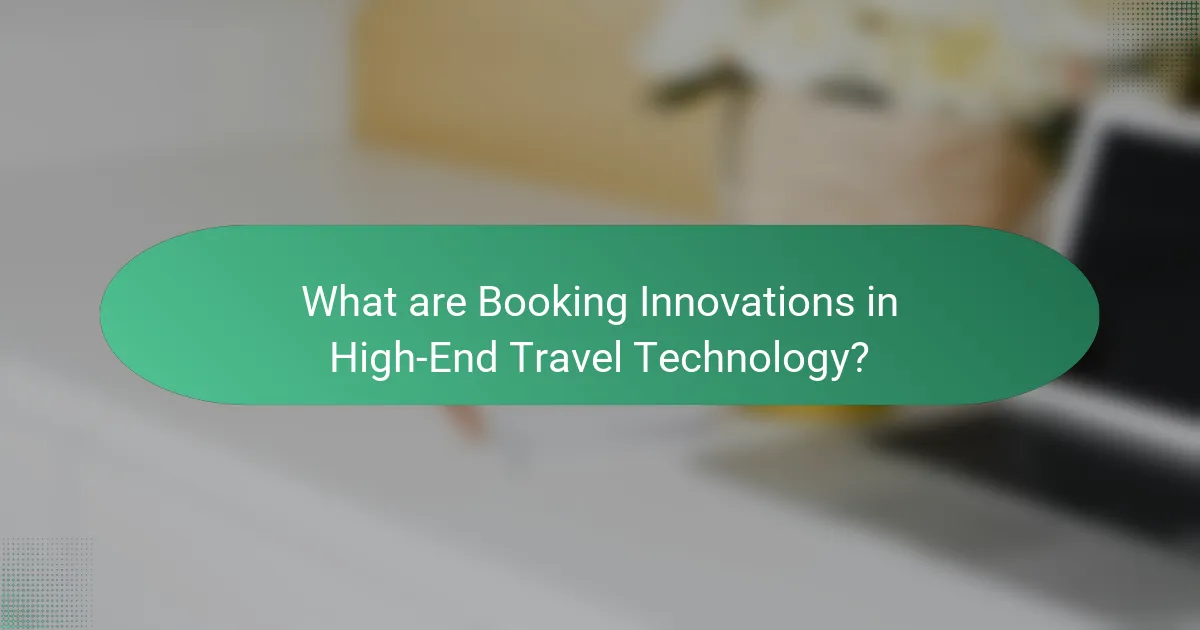
What are Booking Innovations in High-End Travel Technology?
Booking innovations in high-end travel technology refer to advanced methods enhancing the reservation process for luxury travel. These innovations include artificial intelligence-driven platforms that personalize user experiences. They also involve mobile applications that streamline booking and provide real-time updates. Additionally, integration of virtual reality allows potential travelers to explore destinations before booking. Contactless check-in and digital concierge services are becoming standard in luxury accommodations. These innovations aim to enhance guest convenience and satisfaction. According to a report by Phocuswright, 62% of travelers prefer booking through mobile devices, highlighting the importance of these technological advancements.
How have booking platforms evolved in the high-end travel sector?
Booking platforms in the high-end travel sector have evolved significantly to enhance user experience and service quality. Initially, these platforms focused on basic functionalities like price comparison and reservations. Over time, they integrated advanced technologies such as artificial intelligence for personalized recommendations. Many platforms now offer seamless mobile applications that facilitate instant bookings and real-time updates.
Additionally, high-end booking platforms have incorporated virtual reality tools, allowing users to explore properties before making reservations. They also provide tailored services, such as concierge options and exclusive deals for luxury accommodations. Data analytics has become crucial, enabling platforms to predict trends and customize offerings based on user preferences.
According to a 2022 report by Skift Research, 75% of luxury travelers prefer booking platforms that offer personalized experiences. This shift reflects the industry’s focus on catering to the unique needs of affluent clientele. As a result, booking platforms now play a pivotal role in shaping the high-end travel experience.
What are the benefits of using advanced booking systems?
Advanced booking systems enhance efficiency and customer satisfaction in travel management. They streamline the reservation process, reducing the time needed to book services. These systems minimize human error, ensuring accurate bookings and confirmations. They often provide real-time availability, allowing travelers to secure their preferred options. Additionally, advanced booking systems can offer personalized recommendations based on user preferences. Statistics indicate that businesses using these systems see a significant increase in customer retention rates. Reports show that automated systems can reduce operational costs by up to 30%. Overall, advanced booking systems contribute to a seamless travel experience.
How do mobile apps enhance the booking process for luxury travelers?
Mobile apps enhance the booking process for luxury travelers by providing streamlined, personalized experiences. They offer instant access to exclusive deals and premium services. Users can compare options seamlessly and make reservations quickly. Mobile apps often include features like virtual tours and real-time availability updates. They enable easy communication with concierge services for tailored requests. Push notifications keep travelers informed about special offers and promotions. According to a report by Phocuswright, 70% of luxury travelers prefer using mobile apps for bookings. This preference highlights the convenience and efficiency mobile apps bring to the luxury travel experience.
What role does AI play in booking innovations?
AI enhances booking innovations by streamlining processes and personalizing user experiences. It analyzes customer data to predict preferences, enabling tailored recommendations. AI chatbots provide instant customer support, improving response times. Machine learning algorithms optimize pricing strategies based on demand and competition. According to a 2022 study by Phocuswright, AI-driven tools increased booking efficiency by 30%. This technology also automates administrative tasks, allowing staff to focus on guest relations. Overall, AI significantly transforms the booking landscape in the travel industry.
How does AI improve the accuracy of travel recommendations?
AI improves the accuracy of travel recommendations by analyzing vast amounts of data. It utilizes machine learning algorithms to identify patterns in user preferences. These algorithms consider factors like past travel history, user reviews, and real-time location data. AI systems can personalize recommendations based on individual tastes and interests. For example, a study by McKinsey found that personalized recommendations can increase customer engagement by 10 to 30 percent. Additionally, AI can adapt recommendations in real-time, responding to changing user needs. This dynamic adaptability enhances the relevance of suggestions. Overall, AI’s data-driven approach leads to more precise and tailored travel options for users.
What are the implications of AI-driven customer service in travel bookings?
AI-driven customer service in travel bookings enhances efficiency and personalization. It automates responses, reducing wait times for customers. This technology analyzes customer data to provide tailored recommendations. AI chatbots can handle multiple inquiries simultaneously, improving service availability. According to a report by McKinsey, companies using AI in customer service see a 30% increase in customer satisfaction. Additionally, AI can predict customer preferences based on past behavior, leading to more relevant offerings. This results in higher conversion rates for bookings. Overall, AI-driven customer service transforms the travel booking experience, making it more responsive and user-centric.
How do booking innovations contribute to guest convenience?
Booking innovations enhance guest convenience by streamlining the reservation process. Online platforms allow guests to book accommodations instantly from anywhere. Mobile apps facilitate real-time updates and notifications about bookings. Automated check-in systems reduce wait times at the front desk. Contactless payment options improve transaction speed and safety. Virtual tours enable guests to preview properties before booking. Personalization features tailor recommendations based on user preferences. These innovations collectively improve the overall guest experience, making travel planning more efficient and enjoyable.
What features streamline the check-in process for guests?
Mobile check-in applications streamline the check-in process for guests. These applications allow guests to check in remotely before arriving. Digital key technology enables guests to unlock their rooms via smartphones. Self-service kiosks reduce wait times by allowing guests to check in independently. Automated notifications inform guests of their room status and check-in time. Integration with booking systems ensures seamless data transfer and accuracy. Contactless payment options enhance convenience and safety during check-in. These features collectively improve guest experience and operational efficiency in high-end travel environments.
How do automated systems enhance the overall travel experience?
Automated systems enhance the overall travel experience by streamlining processes and increasing convenience. They facilitate faster check-in and check-out procedures, reducing wait times at hotels and airports. Automated systems also provide personalized recommendations based on traveler preferences. These systems can manage room settings, such as temperature and lighting, to create a comfortable environment. Additionally, they offer real-time updates on flight statuses and gate changes, improving travel efficiency. Data from the International Air Transport Association indicates that automation can reduce operational costs by up to 30%. Overall, automated systems contribute to a more enjoyable and efficient travel journey.
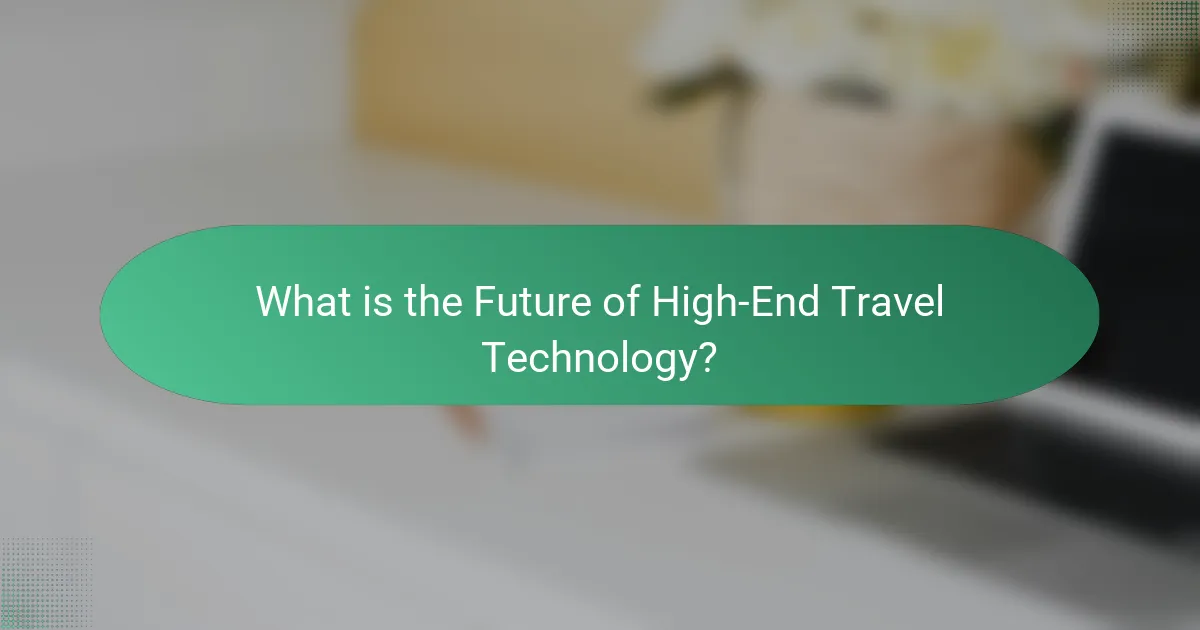
What is the Future of High-End Travel Technology?
The future of high-end travel technology will focus on enhanced personalization and seamless integration. Smart room features will use AI to adapt to guest preferences in real-time. Booking innovations will streamline processes through advanced algorithms and machine learning. Contactless services will become standard, ensuring convenience and safety. Virtual reality will enhance pre-travel experiences, allowing guests to explore destinations before arrival. Data analytics will drive personalized marketing strategies, improving customer engagement. Sustainability will be a priority, with technology minimizing environmental impact. These trends indicate a shift towards a more intuitive and luxurious travel experience.
What upcoming technologies could redefine high-end travel?
Upcoming technologies that could redefine high-end travel include artificial intelligence, virtual reality, and advanced biometrics. Artificial intelligence can personalize travel experiences through tailored recommendations. Virtual reality offers immersive previews of destinations and accommodations. Advanced biometrics streamline check-in processes with [censured] recognition. Smart room features enhance guest comfort and convenience through automation. Mobile apps facilitate seamless booking and itinerary management. Sustainable technologies promote eco-friendly travel options. These innovations aim to elevate luxury travel experiences significantly.
How might virtual reality change the way travelers experience destinations?
Virtual reality (VR) may significantly transform how travelers engage with destinations. VR allows users to explore locations virtually before visiting. This immersive experience can enhance decision-making about travel plans. Travelers can visualize accommodations, attractions, and activities in a realistic setting. Studies indicate that 60% of travelers are more likely to book a trip after a VR experience. Additionally, VR can provide guided tours and cultural experiences remotely. This technology can also assist in overcoming physical limitations for those unable to travel. Overall, VR enriches the travel planning process and enhances destination experiences.
What innovations are on the horizon for smart room technology?
Innovations on the horizon for smart room technology include advanced AI integration, improved IoT connectivity, and enhanced user interfaces. AI will enable personalized experiences based on guest preferences and behavior. IoT connectivity will allow seamless interaction between devices, enhancing automation and control. Enhanced user interfaces will focus on intuitive design for easier navigation and control. Voice-activated systems are expected to become more sophisticated, responding to natural language commands. Energy efficiency features will optimize resource usage, contributing to sustainability. Smart room technology will increasingly incorporate health monitoring systems for guest well-being. Finally, augmented reality applications may provide immersive experiences tailored to individual guests.
How can travelers prepare for the future of high-end travel technology?
Travelers can prepare for the future of high-end travel technology by staying informed about emerging trends. This includes researching advancements in smart room features and booking innovations. Understanding how technology enhances guest convenience is crucial. Travelers should consider adopting smart devices that integrate with hotel systems. Familiarity with mobile apps for seamless check-in and room control is beneficial. Additionally, engaging with travel communities can provide insights on the latest tech offerings. Awareness of data privacy and security measures is also important as technology evolves. Keeping abreast of industry reports, such as those from the Global Business Travel Association, can offer valuable forecasts and trends.
What should guests consider when choosing accommodations with advanced technology?
Guests should consider the integration and usability of advanced technology in accommodations. Features like smart room controls enhance convenience and comfort. Guests should evaluate the security of technology, such as keyless entry systems. High-speed internet access is crucial for business and leisure travelers. Compatibility with personal devices is important for seamless connectivity. The presence of smart assistants can improve guest experience. Energy efficiency features can indicate sustainability efforts by the accommodation. User reviews often highlight the effectiveness of technology in enhancing stay quality.
How can travelers stay informed about the latest trends in high-end travel technology?
Travelers can stay informed about the latest trends in high-end travel technology by following industry news sources. Websites like Skift and Travel Weekly frequently publish updates on travel technology advancements. Subscribing to newsletters from luxury travel brands can also provide insights into new technologies. Attending travel expos and conferences is another effective way to learn about innovations. Engaging with travel technology forums and social media groups can facilitate discussions on emerging trends. Additionally, reading travel blogs that focus on luxury experiences can offer valuable information. These methods ensure travelers are aware of the latest developments in high-end travel technology.
What are the best practices for utilizing high-end travel technology?
The best practices for utilizing high-end travel technology include ensuring seamless integration, prioritizing user experience, and maintaining robust security measures. Seamless integration allows various technologies to work together efficiently. This enhances guest convenience and satisfaction. Prioritizing user experience involves designing intuitive interfaces that guests can easily navigate. Research shows that 70% of travelers prefer technology that simplifies their experience. Maintaining robust security measures protects guest data and builds trust. Regular updates and assessments of technology systems are essential for optimal performance. These practices collectively enhance the overall effectiveness of high-end travel technology.
How can guests maximize their experience with smart room features?
Guests can maximize their experience with smart room features by familiarizing themselves with the available technology. Understanding how to use smart controls for lighting, temperature, and entertainment enhances comfort. Guests should explore mobile apps or in-room tablets that manage these features easily. Utilizing voice commands can streamline interactions with the room’s technology.
Engaging with personalized settings can tailor the environment to their preferences. Guests can also take advantage of automated features, such as smart curtains or alarm systems, for convenience. Checking for integration with personal devices can further enhance the experience. Lastly, seeking assistance from hotel staff can provide insights into maximizing the use of smart room features.
What tips can enhance the use of booking innovations for travelers?
Travelers can enhance their use of booking innovations by utilizing mobile apps for real-time updates. These apps often provide instant notifications about flight changes or gate information. Additionally, travelers should compare prices across multiple platforms to ensure the best deals. Many booking innovations offer price alerts, which can help users secure lower rates.
Using loyalty programs can also maximize benefits from booking innovations. Members often receive exclusive discounts or upgrades. Furthermore, travelers should read reviews to gauge the reliability of booking platforms. Verified user experiences can inform better decisions. Lastly, travelers should take advantage of virtual tours when available. These features allow for informed choices regarding accommodations.
High-end travel technology encompasses advanced systems and tools that enhance the travel experience, particularly through smart room features and booking innovations. Key elements include automated room controls, personalized booking solutions, and seamless guest services designed to improve convenience and satisfaction. The article explores how these technologies differ from standard offerings, their impact on customer satisfaction, and the evolving trends shaping the future of luxury travel. Additionally, it addresses the importance of user interfaces, data protection, and best practices for maximizing the benefits of high-end travel technology.
